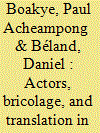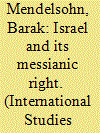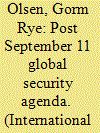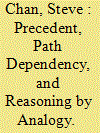|
|
|
Sort Order |
|
|
|
Items / Page
|
|
|
|
|
|
|
| Srl | Item |
| 1 |
ID:
187435


|
|
|
|
|
| Summary/Abstract |
Due to the centrality of education to economic growth and social development, successive governments in post-colonial Ghana have implemented policies to improve the quality of education in the country. In line with this, Ghana embarked on its first major education reform in 1987 under the Provisional National Defence Council (PNDC) government. While several studies have been conducted to explain this reform, these studies have largely been descriptive and theoretically, have over relied on the conditionality thesis. Our study draws on ideational literature and research interviews to offer an alternative explanation of the 1987 reform. Drawing extensively on the ideational concepts of bricolage and translation and focusing on the actors using these two mechanisms, the study argues that, while exogenous forces did impact the 1987 reform, it was mainly driven by endogenous factors featuring both path dependent and departing changes.
|
|
|
|
|
|
|
|
|
|
|
|
|
|
|
|
| 2 |
ID:
117232


|
|
|
|
|
| Publication |
2013.
|
| Summary/Abstract |
This paper describes initial analysis of branching points on a set of transition pathways to a UK low carbon electricity future by 2050. As described in other papers in this special issue, we are exploring and analysing a set of core transition pathways, based on alternative governance patterns in which the 'logics' of market actors, government actors and civil society actors, respectively dominate. This core pathway analysis is enhanced by analyses of branching points within and across the pathways, which informs how competition between different logics plays out at key decision points. Branching points are defined as key decision points at which choices made by actors, in response to internal or external stresses or triggers, determine whether and in what ways the pathway is followed. A set of initial branching points for our three core transition pathways is identified through project and stakeholder workshops, and drawing on analysis of actors' choices and responses at past branching points in energy system transitions. The potential responses of the actors are identified at these branching points, and risk mitigation strategies are formulated for the dominant actors to reinforce that pathway, as well as opportunities for actors to move away from the pathway.
|
|
|
|
|
|
|
|
|
|
|
|
|
|
|
|
| 3 |
ID:
167626


|
|
|
|
|
| Summary/Abstract |
State control of land plays a critical role in producing land dispossession throughout the Global South. In Myanmar, the state’s approach towards territorial expansion has driven the country’s system of land governance, resulting in widespread and systemic land grabbing. This article investigates ongoing land governance reforms as key terrains for contesting such abuses of power. Employing a relational land governance approach, we view reform processes as shaped by changing power-laden social relations among government, civil society, and international donor actors. Legal and regulatory reforms in Myanmar potentially act as sites of meaningful social change but in practice tend to maintain significant limitations in altering governance dynamics. Civil society organizations and their alliances in Myanmar have played an important role in opening up policy processes to a broader group of political actors. Yet, policies and legal frameworks still are often captured by elite actors, becoming trapped in path dependent power relations.
|
|
|
|
|
|
|
|
|
|
|
|
|
|
|
|
| 4 |
ID:
098146


|
|
|
|
|
| Publication |
2010.
|
| Summary/Abstract |
Sub-state nationalist parties of the industrialised West occupy different positions along the left-right political spectrum. Despite the similarities of their political agendas, these parties adopt different ideological identities. This paper seeks to explain the choice of party position and the long-term consistency of these positions by employing a path-dependent perspective. The focus is first, on the critical junctures during which such choices are made; and second, on the mechanisms of continuity ensuring the persistence of the left-right identities. The argument is explored within the empirical context of Québécois nationalism.
|
|
|
|
|
|
|
|
|
|
|
|
|
|
|
|
| 5 |
ID:
146182


|
|
|
|
|
| Summary/Abstract |
Why do states responsible for unleashing violent nonstate actors fail to halt them despite rising costs and, at best, marginal utility? I argue that a historical-institutionalist approach helps scholars understand these dynamics. I present five path-dependent mechanisms—change in the balance of power, spiraling perception of threat, ideological shift among the public, state penetration, and weakening of the principle of state primacy—that diminish the prospects of policy reversals. I then demonstrate the usefulness of path-dependency analysis in the case of Israel’s entanglement with the Jewish messianic Right. Applying the theoretical framework sheds light on the process that brought Israel prohibitive costs—undercutting the Israeli-Palestinian peace process, undermining the state’s international standing, and weakening the state’s authority and democratic nature—and made policy reversal, in line with the state’s national interest and its responsibilities as a member of the international society, highly unlikely.
|
|
|
|
|
|
|
|
|
|
|
|
|
|
|
|
| 6 |
ID:
178693


|
|
|
|
|
| Summary/Abstract |
How successful have emerging powers been at increasing their representation within the secretariats of international organizations (IOs)? We examine the representation of the BRIC countries (Brazil, Russia, India, and China) in the International Monetary Fund (IMF), the World Trade Organization (WTO) and the United Nations (UN) System, including the UN Secretariat, over the last two decades. The analysis reveals four major findings. First, some redistribution of staff positions from established to emerging powers has taken place, but it has been relatively minor. Second, nationals from emerging powers are still strongly under-represented in international secretariats in comparison with those from established powers. Third, emerging powers’ representation at the IMF and WTO increased more than in the UN, where it actually declined. Fourth, there is strong variation between emerging powers: India appears to be the most successful emerging power in sending its nationals to the secretariats of IOs, Brazil’s and China’s records are mixed, and Russia has fared poorly. We interpret our findings in light of international relations theories and theories of institutional path dependence. The results suggest that staffing patterns are only loosely related to shifts in economic size and are subject to strong independent institutional dynamics.
|
|
|
|
|
|
|
|
|
|
|
|
|
|
|
|
| 7 |
ID:
134337


|
|
|
|
|
| Summary/Abstract |
The present article offers an account of Swedish integration policies in the post-war period. The theoretical purpose is to assess Christian Joppke’s hypothesis that recent trends of integration policy convergence have rendered the national model approach analytically useless. The analysis shows that Sweden deviates, in some important respects, from the European trend by not formulating demands that link integration achievements to immigrants’ access to fundamental rights. The conclusion is that the Swedish case does not support Joppke’s hypothesis, but rather indicates that path dependency of national models is a valid explanation to ongoing developments. It is argued that the Swedish exception should be understood as an expression of the persistent impact of a policy logic according to which integration requires that all citizens have equal and universal access to certain fundamental rights. The article builds on general comparisons with European policy developments and uses Denmark as a more specific reference point.
|
|
|
|
|
|
|
|
|
|
|
|
|
|
|
|
| 8 |
ID:
082348


|
|
|
|
|
| Publication |
2008.
|
| Summary/Abstract |
The Africa policies of the United States and of the European Union seem to have undergone significant changes in the years following September 2001. Nevertheless, the paper shows that the choice of policy instruments has been path dependent in both cases. The American policy is not totally path dependent if the size of the military initiatives and the volume of development aid are included in the analysis. The Africa policy of the EU is path dependent even when the increase in development assistance is taken into account. The growth in EU aid can only be explained by reference to the influence of values and norms. Even though September 11 is a 'breaching point', path dependency and bureaucratic inertia seem to be able to explain most of the lacking changes. However, agency-based explanations are also necessary
|
|
|
|
|
|
|
|
|
|
|
|
|
|
|
|
| 9 |
ID:
187984


|
|
|
|
|
| Summary/Abstract |
This essay addresses the strategic implications of the Russo–Ukrainian War as it pertains to relations between China and the US, especially with respect to how this conflict may inform prospective developments across the Taiwan Strait. I pursue this question under three topics: the influence of precedents, path dependency, and reasoning by analogy. The war in Ukraine has interrupted Washington’s intention to pivot to Asia to focus on containment of a rising China, and it has also caused Moscow and Beijing to align more closely. Finally, it may have made the direct military intervention of the US in a possible future crisis involving Taiwan less likely.
|
|
|
|
|
|
|
|
|
|
|
|
|
|
|
|
|
|
|
|
|